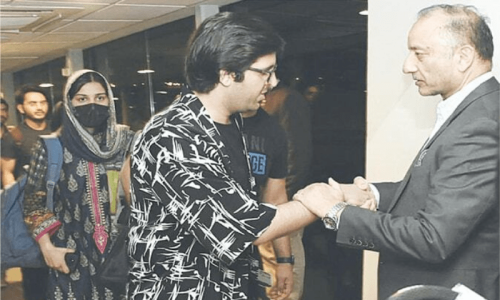ISLAMABAD, Feb 11: Tehrik-i-Minhajul Quran chief Dr Tahirul Qadri may have made waves with his four-day sit-in last month but he was cut to size when he appeared before the Supreme Court on Monday to plead for reconstitution of the Election Commission of Pakistan (ECP).
He waited for hours for his turn and when his case was eventually taken up, the court dropped a bombshell by asking him whether he had sworn allegiance to Queen Elizabeth of United Kingdom.
Dr Qadri who had kept himself busy throughout the day consulting his advisers and giving final touches to his written submissions appeared at a loss for words when a three-judge bench asked point blank at the outset of the hearing whether he was a citizen of any other country.
He conceded that he had acquired Canadian citizenship in 2005 after resigning as a member of parliament, but hastened to add that he had not ceased to be a Pakistani national.
Dr Qadri has challenged the appointment of the chief election commissioner (CEC) and four members of the ECP, arguing that their appointments were not in accordance with the provisions of Articles 213 and 218 of the Constitution.
The court, however, referred to a recent judgment on dual nationality and highlighted a bar on Dr Qadri from entering parliament as long as he remained a citizen of Canada.
He was asked that when he had sworn allegiance to another country how could he point out deficiencies in parliament which represented the will of 180 million people by pushing a case of public importance before the Supreme Court.
Attorney General Irfan Qadir, when asked to give his opinion, said he did not agree with the contents of the petition but the court itself had enlarged the scope of locus standi (right to appear) under the enforcement of fundamental rights.
“This is a case of co warranto where the question of locus standi will not arise,” he said, citing the July 31, 2009, case in which 108 superior court judges had been removed without dealing with the issue of locus standi.
Talking to Dawn later, senior counsel Waqar Rana said that in his view Dr Qadri had not lost his Pakistani nationality and, therefore, also enjoyed certain fundamental rights as a citizen.
“There is also no bar that he cannot invoke the jurisdiction of the Supreme Court, but while doing so he has to meet a certain threshold of Article 184(3) of the Constitution by establishing that his fundamental rights have been violated and that such violations affect the public at large,” he said.
Former president of Supreme Court Bar Association Tariq Mehmood cited the 1988 Benazir Bhutto case challenging a ban on political parties imposed by the Ziaul Haq regime and explained that since Dr Qadri was neither the head of a party nor intending to enter parliament, it appeared that he had no nexus to raise a question of such a public importance before the court.
The court asked Dr Qadri to submit a concise statement by Tuesday, admitting that he had sworn oath of allegiance to another country and that the federal government had issued a notification allowing him to retain the citizenship of Pakistan at the same time.
If the court is satisfied with the reply the petitioner will get the right to argue his case.
Dr Qadri, who commenced his arguments by praising the role played by Chief Justice Iftikhar Muhammad Chaudhry for the independence of judiciary, was asked to confine his arguments to explaining why he had not given his introduction in the petition to establish his locus standi to stand before the court.
The court specifically asked whether he had acquired the foreign nationality for business interests or because of a threat to his life in Pakistan.
Dr Qadri said he had applied in 1997 for the citizenship in accordance with the law through normal procedures in an ordinary manner for certain categories, one of which was reserved for religious scholars.
He cited Section 14(3) of the Pakistan Citizenship Act of 1951, suggesting that a citizen of Pakistan could hold dual citizenship of the United Kingdom and colonies or of another such country as the government might specify by notification in the official gazette and said Canada was a Commonwealth country.
But Justice Sheikh Azmat Saeed reminded the plaintiff that a citizen could not enjoy simultaneous nationality of Pakistan and India although both were Commonwealth countries.
Dr Qadri admitted that the laws did not permit him to contest general election but said he had gone to the court as an ordinary voter for which there was no bar.
He explained to reporters outside the court that he had acquired the Canadian citizenship because it helped him get visas easily which he needed occasionally being a scholar for giving lectures in different countries.













































Dear visitor, the comments section is undergoing an overhaul and will return soon.